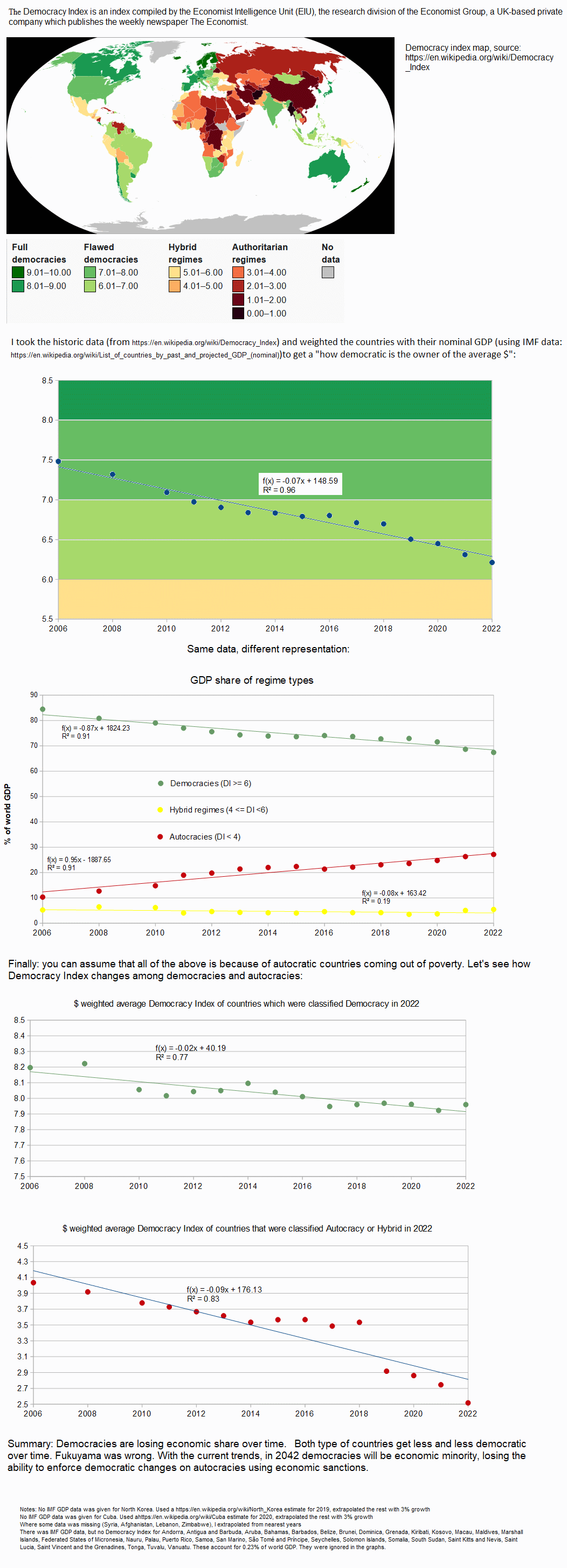Comments
[deleted] t1_jc9m84n wrote
[removed]
Jeffcor13 t1_jc9duwc wrote
I know a guy who lives in Florida. He genuinely loves America and talks about democracy. He also supports the governor there who is banning books, banning healthcare choices, banning private businesses from even hosting gatherings for people that look a certain way.
Democracy is indeed in a precarious position. But sadly many people who seem to talk about it are actively voting for people who oppose it.
DoeCommaJohn t1_jc9ei3m wrote
It’s a lot easier to support democracy in theory than in practice. Are you really going to support democracy over a little bit of gerrymandering if it means your party wins? If your party is anti-democratic, are you really going to vote for the other guys?
b_imre OP t1_jc7a66y wrote
Sources:
Democracy Index: https://en.wikipedia.org/wiki/Democracy_Index
GDP data: https://en.wikipedia.org/wiki/List_of_countries_by_past_and_projected_GDP_(nominal)
Graphs were created using Openoffice Calc
GibtEsKeinenGott t1_jc90aki wrote
The democracy index is not scientific. The publication that produces it just asks random blokes of their choosing to rate countries. They do not publish who these people are and what their ratings were. Trash data IMO. From your link, see.
[deleted] t1_jc931k2 wrote
[removed]
DoeCommaJohn t1_jc9edxu wrote
There’s a difference between data being unscientific and data being bad. If there were better data available, I’d agree, but the democracy index is still a fine way to show what some experts think of democracies around the world
GibtEsKeinenGott t1_jc9flt7 wrote
How do you know the people they choose are even experts if they refuse to reveal who these people are? I understand the difference between bad data and unscientific data and to me that is a distinction without a difference. Unless we know who these people are and can clearly see the metrics they are using to objectively measure the level of democracy in these countries, then we are just believing their claims on faith. It is like if a poll of 10 "random" soda experts is published where they rank flavors of various drinks and Coke comes out on top, yet the authors of the poll fail to mention that 8 of them don't like the taste of lemon and 6 of them happen to work for Coca-Cola. That might be important information.

VikThorior t1_jc9koih wrote
Weird choice to weigh the democratic index by the GDP. The 10 richest western countries make up for ~40% of the world GDP, but only ~9% of the world population.
I would understand not weighing by population as it would give too much weight to some countries, but the GDP does the same in a much worse way.
For the population, there is an reason for doing so: it gives the Democracy Index of an average world citizen. But for the GDP, it gives the Democracy Index of an average... US$.
Moreover, GDP (par capita) and Democracy Index are correlated, so it's problematic to weigh one by the other.